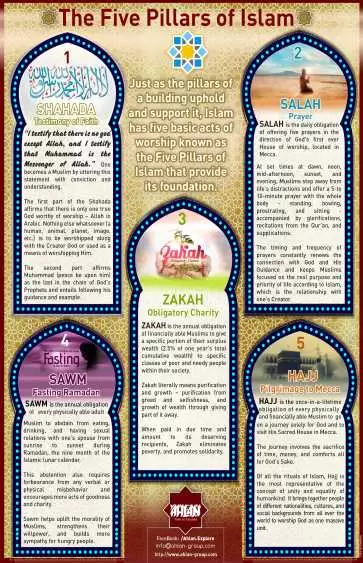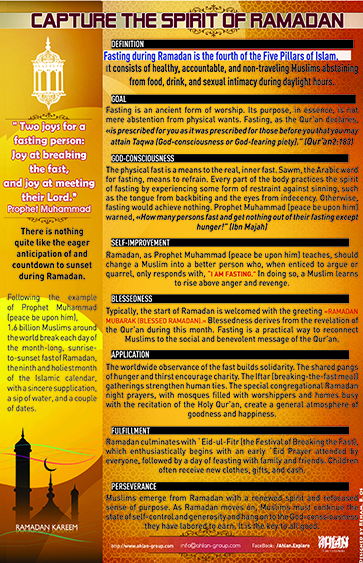Islam’s practices embody submission to Allah, with acts like daily prayers, fasting, charity, and pilgrimage offering spiritual growth and societal harmony. By aligning life with divine teachings, Muslims aim to strengthen their bond with Allah and promote justice and kindness globally.
Islam is one of the world’s major religions, with about 2 billion followers. The beliefs and practices of Islam are centered around submission to the will of Allah (God), as revealed through Prophet Muhammad, who is the Final Prophet sent to mankind, and as explained in the Quran, the last unchanged book of guidance for all people.
In this article, we will explore ten major worship practices of Islam in some detail. We will discuss them with examples and evidence from the Quran and the Sunnah (the sayings and teachings of Prophet Muhammad (peace be upon him)). Then, we will tackle, in a nutshell, the main beliefs of Islam.
Here we will learn the following:
- Islam Religion Practices
- Testimony Of Faith (Shahada)
- Performing Prayer (Salat)
- Giving Charity (Zakat)
- Fasting During Ramadan (Sawm Ramadan)
- Pilgrimage To Mecca (Hajj)
- Reading The Quran
- Good Treatment Towards Parents
- Remembrance Of Allah (Dhikr)
- Caring For The Vulnerable
- Doing Good To All Creatures
- Main Beliefs And Practices Of Islam
- Conclusion
Islam Religion Practices
Worship in Islam is central to a Muslim’s life and is considered the primary purpose of human existence. It encompasses a wide range of practices designed to develop a personal connection with Allah and to uphold moral and spiritual guidance through the Quran and the Sunnah.
Now let’s examine some worship practices of Islam with some pieces of evidence from the Quran and the Hadith of Prophet Muhammad (peace be upon him).
1. Testimony Of Faith (Shahada):
The Shahada, or testimony of faith, is the cornerstone of Islamic belief and the most fundamental pillar of Islam. It is a profound declaration that acknowledges the oneness of Allah and the prophethood of Muhammad (peace be upon him). Every Muslim must sincerely affirm and recite: “There is no god but Allah, and Muhammad is the messenger of Allah.”
This simple yet powerful statement encapsulates the essence of Islamic monotheism, or Tawheed, which emphasizes that Allah is the sole Creator, Sustainer, and Worthy of worship. It also recognizes Prophet Muhammad (peace be upon him) as the final messenger, sent to guide humanity to the path of righteousness.
The Shahada is not just a verbal affirmation but a heartfelt commitment that influences a Muslim’s thoughts, actions, and worldview. It establishes the believer’s identity, creating a direct and unshakable connection to Allah. Reciting the Shahada is a prerequisite for embracing Islam and is often the first step in a Muslim’s spiritual journey, signifying their acceptance of the faith and submission to Allah’s will.
By living in accordance with the Shahada, Muslims strive to worship Allah alone, follow His commandments, and emulate the teachings and example of Prophet Muhammad (peace be upon him), ultimately seeking to lead a life that pleases Allah and earns His eternal reward.
2. Performing Prayer (Salat):
Salat refers to the five daily prayers that Muslims observe at specific times during the day. These prayers are:
- Sobh: Performed before sunrise
- Dhuhr: Performed after midday
- Asr: Performed in the afternoon
- Maghrib: Performed just after sunset
- Isha: Performed at night
Obligatory Salat is mentioned in so many sections of the Quran, including:
“Indeed, performing prayers is a duty on the believers at the appointed times.”
In this part of the verse, Allah declares that daily prayers are obligatory for all Muslims at specific times of the day.
Muslims can do more than those obligatory 5 prayers, to gain more and more rewards from Allah. These extra prayers are called Nawafil.
3. Giving Charity (Zakat):
Zakat is the practice of donating to charity to support those in need. It is viewed as both an act of worship and a means of promoting social justice. Muslims are obligated to give a portion of their accumulated wealth (typically 2.5% of savings) to the needy each year. This not only purifies one’s wealth but also helps to reduce poverty and inequality within the community.
Muslims are also encouraged to give Sadaqah (voluntary Zakat). Unlike Zakat, Sadaqah is not limited to a fixed amount or specific circumstances and can be given at any time, in any form, and to anyone in need.
The Broader Concept Of Charity In Islam:
While giving money to the poor and needy is the most common form of Sadaqah, it can also include acts of kindness, as simple as offering a smile, helping someone with a task, providing guidance, or even removing something harmful from the road.
4. Fasting During Ramadan (Sawm Ramadan):
Sawm Ramadan refers to the practice of fasting in the Islamic month of Ramadan, the ninth month of the Islamic lunar calendar. Muslims observe the fast from dawn to sunset, refraining from food, drink, smoking, and marital relations during daylight hours.
In the Quran, Allah says about Sawm Ramadan:
“O believers! Fasting is prescribed for you—as it was for those before you”.
Here, Allah commands all Muslims to fast during the month of Ramadan, like those who came before them who were also commanded by Allah to fast.
As with Salat and Zakat, Muslims are encouraged to do fasting which is not obligatory but is performed by choice, as an act of worship to seek closeness to Allah and earn rewards. Unlike fasting during Ramadan, voluntary fasting can be done at any time throughout the year, except during certain prohibited times, such as during menstruation for women. This fasting includes for example Fasting on Mondays and Thursdays.
5. Pilgrimage To Mecca (Hajj):
Hajj is the sacred pilgrimage to Mecca in Saudi Arabia, which every Muslim must complete at least once in their lifetime during the Islamic month of Dhul-Hijjah, as long as they are physically and financially able. This pilgrimage involves a series of rituals performed in and around Mecca, reflecting on the sacrifices made by Prophet Ibrahim (Abraham) and his family (peace be upon them).
In the Quran, Hajj is mentioned in so many verses, such as:
“Complete the pilgrimage and minor pilgrimage for Allah.”
Here, Hajj (Pilgrimage) is obligatory for Muslims at least once in their lifetime, while Umrah (minor pilgrimage) is not obligatory, but is highly recommended for Muslims as many times as they can.
6- Reading The Quran:
Muslims are encouraged to read the Quran regularly and to reflect upon its meanings. Even looking at its text is considered an act of worship. It is not just a book to be read for reward, but it is also meant to be understood and applied in daily life. In fact, the Quran is Muslims’ shortest way to get closer to Allah through:
1- Reciting it
2- Reflecting on its meanings
3- Applying what has been reflected upon in their lives
4- Memorizing it
7- Good Treatment Towards Parents:
Muslims are commanded by Allah to show respect, care, and good treatment towards their parents. This is a highly emphasized value in Islam. The Quran and Hadith both stress the importance of honoring and being kind to one’s parents, especially in their old age.
In this context, Allah says:
“…Honour your parents. If one or both of them reach old age in your care, never say to them ˹even˺ ‘ugh,’ nor yell at them. Rather, address them respectfully. And be humble with them out of mercy, and pray, “My Lord! Be merciful to them as they raised me when I was young.”
Here Allah gives multiple commands for the offspring concerning their parents:
1- Honor them, especially in their old age
2- Never say to them even “ugh” out of anger or frustration nor yell at them
3- Address them respectfully
4- Be humble with them
5- Be merciful with them
6- Pray for them
8- Remembrance Of Allah (Dhikr):
Remembrance of Allah (Dhikr) is central in Islam, emphasizing the importance of maintaining a conscious connection with Allah in every aspect of life. It is a practice that can be done at any time and in any place. The word “Dhikr” literally means “remembrance” and Islamically, it refers to the continuous act of recalling Allah’s presence, attributes, and greatness through actual saying and mindful reflection.
This practice can be as simple as saying short phrases like:
1- “La Illah Ila Allah” (There is nothing worthy of worship except Allah)
2- “Subhan Allah” (Glory be to Allah)
3- “Alhamdulillah” (All thanks is due to Allah)
9- Caring For The Vulnerable:
In any community, the vulnerable, such as the poor, the disabled, the elderly, the orphans, etc. are the most unfortunate. That is because the rich can always provide for themselves and the strong can always protect themselves. But as for those vulnerable groups, the community members must protect, provide, and care for them.
Islam explicitly dictates that all Muslims should respect and care for the elderly, provide for the poor, be compassionate toward children, and take special care of orphans. The very existence of orphanages and elderly care homes in a Muslim community may indicate that there are gaps in fulfilling the Quranic and Sunnah-based commands of caring for the most vulnerable members of society.
10- Doing Good To All Creatures:
In Islam, good treatment is guaranteed for all creatures of Allah, including all people from all races, colors, backgrounds, and religions. Muslims are also commanded to be good to animals.
[the narration of the practicing Muslim woman who was admitted to Hell for locking up a cat and not providing food for it, is strong evidence for how Allah punishes those who mistreat animals]
In this regard, Allah says:
“Indeed, Allah commands justice, grace, as well as generosity to close relatives. He forbids indecency, wickedness, and aggression. He instructs you so perhaps you will be mindful.”
This verse is just an example of Islam’s collective and comprehensive call for ethics and good treatment for all people and all creatures.
Main Beliefs And Practices Of Islam
Together, the beliefs and practices of Islam guide Muslims toward a life of devotion, ethics, and social responsibility. There are 6 Pillars of Faith [belief in Allah, His Angels, His Books, His Messengers, the Last Day, and Predestination]. These beliefs along with the worship practices of Islam are complementary, meaning that belief without good work and good work without belief will not save an individual in the Day of Judgment.
For more about beliefs and practices of Islam, refer to this article: The Top 6 Major Beliefs Of Islam With Main Practices
Conclusion
To sum up, worship practices in Islam provide a holistic approach to life, aiming to align the individual’s actions with divine guidance. Through these practices, Muslims seek to strengthen their relationship with Allah, fulfill their purpose in this life, and prepare for the Afterlife. Worship practices are not confined to ritual acts; everyday activities like honesty, seeking knowledge, fulfilling obligations to family and society, etc. are acts of worship in Islam if done with the intention of pleasing Allah.













